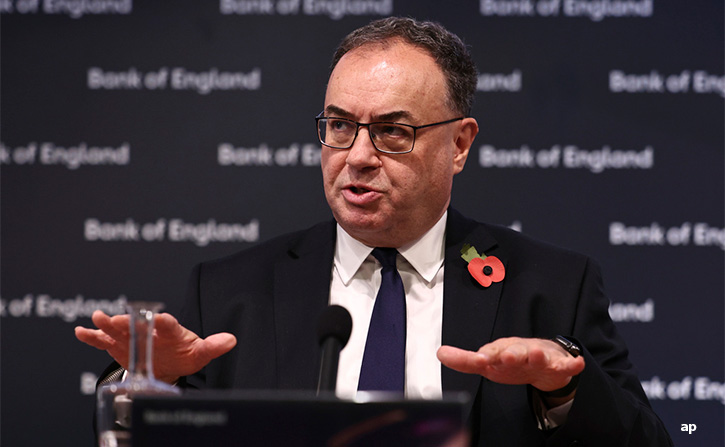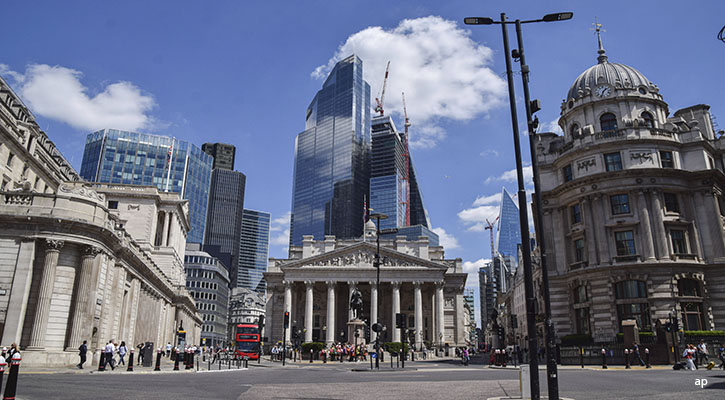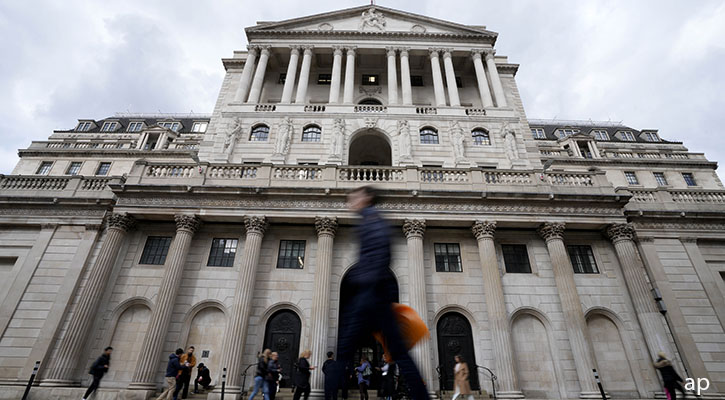
There are probably three key questions facing UK investors next year and two are time-contingent. The prospect of a general election in 2024 is obvious, but for some, the Bank of England is the main focus. Whether the UK can dodge recession is the other.
You can see how all three are connected: political parties depend on homeowners to vote them out or back in, who in turn depend on mortgage financing to start easing. If this happens consumers may feel in a better position to spend, oiling the wheels of an economy nobody wants to admit is currently experiencing stagflation.
Leaving the politics aside for the time being, it's the trajectory of interest rates I'm most interested in. Here, the Bank of England, while happy to predict inflation's easing next year, is not making parallel promises on the timescale on rate cuts. In some ways, this contributes to a sense of mystery. And asset managers don't agree on when the rate cuts will come.
BoE's Current Stance on Inflation Risk
What it does know is that inflation is falling quickly – and the Bank expects CPI to fall "towards our target of 2% next year".
So we're dealing with an unknown here. Despite mortgage holders' pain, with rates going up from 0.1% to 5.25% through 14 hikes, the Bank doesn't appear to be in a hurry to start unwinding these rises. This is not what those coming off fixed rate products want to hear, but the Bank is a naturally cautious – and dare we say slow moving – institution. Having been criticised for being too slow to react to the inflation menace in the first place (and being too downbeat by the rightwing press) the Bank's policymakers will be keen to avoid the accusation they cut rates too quickly.
Its governor told MPs in November: "I really think the market is putting too much weight on the current data releases and the fact that we've seen inflation come down quite rapidly – that's good news obviously.
"We are concerned about the potential persistence of inflation as we go through the remainder of the journey down to 2%, and I think the market is underestimating that," he commented.
November's Autumn Statement seemed to suggest that the battle against inflation will take longer to win; the OBR now expects CPI to hit the 2% target by 2025 rather than in 2024. That felt like a big change to the official (government) narrative but one the chancellor probably didn’t want to dwell on in November's Autumn Statement.
Given the wide range of scenarios for 2024, it's not a surprise to see investment bank outlooks – a staple of this time of the year – are far from unanimous. If you've bet the house on UK interest rates falling back to 1% next year – triggering celebrations from Middle England's highly-leveraged homeowners – the bankers have some bad news for you. There's even the possibility of rate hikes if inflation doesn't budge.
Canada's RBC BlueBay sums this up neatly: "should inflation remain problematic, as RBC BlueBay expects, then there remains the risk that Bailey and colleagues may re-start a policy tightening cycle later next year, after holding policy on pause for the time being."
If there is a consensus amongs the bigger investment banks, it's that rates will start falling next year. By the end of 2024, Base rate will be between 4.25% and 4.75%. Bank of America is the outlier, predicting four 25bp cuts in 2025, starting in February but nothing in 2024. Our table rounds up the major forecasts in numbers and here are the key takeaways:
Who Thinks What on Rate Cuts in 2024?
Bank of America
Current rate of 5.25% should be the peak. BoE will find the fight against inflation tougher than other major economies. Bar to more rate rises is very high but the risk is highest in the first of half of the year if wages stay high.
Goldman Sachs
Expects rate cuts in February and March 2024, no more rate rises expected.
Morgan Stanley
Sees 100 basis point of cuts next year, starting in May. But stronger than expected global growth and a Fed hike could see the Bank raise rates by as much as 50 basis points – and cuts would be postponed until 2025.
JP Morgan
UK rate cuts unlikely in first half of 2024. MPC to maintain 5.25% well into next year. Recession, which is is expected to last for three quarters, will be the pivot for a change of policy. BoE will then be able to keep cutting into 2025, where most rate cuts will occur.
Vanguard
Central banks will start cutting rates in the second half of 2024.
BlackRock (Investment Institute)
Monetary policy needs to stay tight across the world. "This is a regime of slower growth, higher inflation, higher interest rates – and greater volatility."
BNY Mellon
Rates will settle between 4.5% and 5.5%.
"Looking forward, a generation of workers will need to adjust to global interest rates that are up to five times higher than they were," analysts say.



























